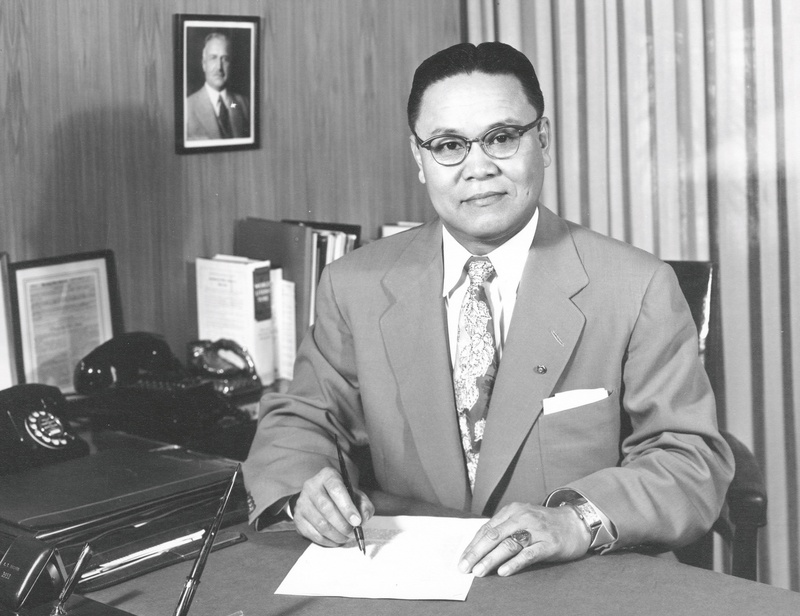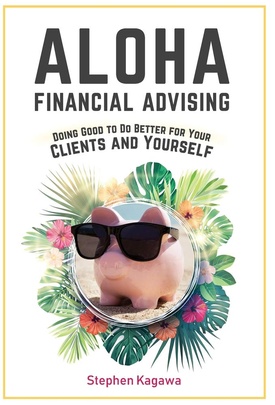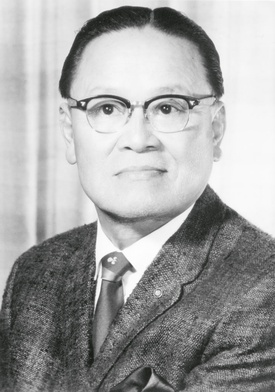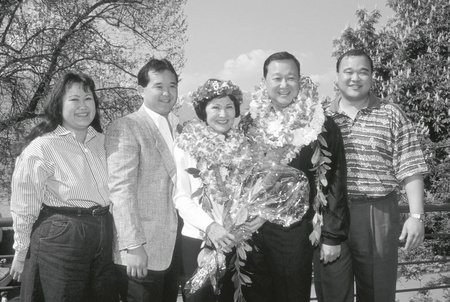The Next Generation
As he strives to leave his mark on the unpredictable, coronavirus-era business world, Nikkei financial maven Stephen Kagawa treads firmly in the footsteps of his innovative, inclusive ancestors. They were Nisei and Sansei who had built Occidental Underwriters of Hawai‘i – by combining fresh financial practices from the mainland with inclusive industry methods aimed to meet the once-impossible-to-achieve aspirational goals of Americans descending from Asian and Pacific Islander settlers in the islands. These practices and methods were provoked by both U.S.-continental racism against people of color on the mainland in setting insurance rates and by Hawai‘i’s “Big Five” oligopoly’s system of exclusionary loan-making against API people in the islands at the time, which had unjustly and systematically blocked their aspirational goals. To combat this, Kagawa’s ancestors had attempted to sell insurance at fair rates to those clients, bucking the national and local financial practices of industry while paving a new path forward.
Now, through the publication of Aloha Financial Advising: Doing Good to Do Better for Your Clients and Yourself, which just debuted on Feb. 15 (Lioncrest Publishing), Kagawa adds his contribution to the family legacy by articulating the next paradigm for modern finance. Pitched to mainstream financial advisors and others working far too conventionally in the U.S. industry, who are oriented mainly to immediate profit, his proposed paradigm fuses the disciplines of banking, insurance, investments, tax, and the law. Kagawa’s goal: to carve out an integrated, 21st-century vision which aims to serve the wide range of needs of multinational individuals and families rather than the short-term, ultimately destructive, chasing of quick sales.
He interrogates the existing field of finance by asserting that the industry model is broken, posing the question, “Why should the ultra-wealthy have all the access to financial understanding, opportunities, advice, products and services?” Kagawa anticipates a future transformation in financial advising “from transactional to a next-gen paradigm that emphasizes collaboration, an ‘Ohana network of advisors and the focus on ‘aloha.’”
The greedy, industry—and community—destructive behavior of Wall Street has been much decried since the 2007 global financial meltdown, characterized by popular culture in movies such as Wall Street: Money Never Sleeps (2010), The Wolf of Wall Street (2013) and the Academy-Award-winning Best Picture of 2016, The Big Short. Criticism of major institutions in the finance industry and their privileging of the super-rich, in the second decade of the millennium, helped to ignite the Occupy Movement and made the mainstream media and general population aware of the (top) “1%” demographic, who since 2010 have owned more than the entire American middle class, according to the Brookings Institution.
Previously, the middle class of the U.S. had owned more than the top 1%, but the former class’s wealth has been declining since 1995 as the latter class’s wealth has risen. Since that economic meltdown and the accompanying Great Recession of 2007-2009, only America’s richest 20% has recovered from the downturn, with the rest of our population continuing to struggle economically — and this was before the COVID-19 era (for more, see “Six facts about wealth in the United States”). Stephen Kagawa’s re-consideration of what this expanding wealth gap means for the industry and its diverse clients is not only timely but necessary.
A Transnational Approach
Kagawa’s approach to addressing long-term patterns of social stratification in the United States is transnational; he hones in on both families and firms from Asia who work in (or work with those in) the U.S., viewing them as disregarded by the mainstream finance industry (aka Wall Street). Like his forebears, he has found a new market by paying mind to the unequal, the marginalized, the overlooked by that industry due to cultural prejudice or racial discrimination.
“The U.S. is a land of 200 nations. But what is seen as ‘financial planning’ here? [It is] only for those that reside in the U.S., and, for the most part, only when you are a citizen,” he points out.
His firm, The Pacific Bridge Companies, helps ethnic communities from (and also in) Asia who immigrate to the U.S.
“Because we understand what they’re going through,” Kagawa adds. He brings opportunities outside of Asia into products for these cultural-community members, to “see if there is any value there, sensitize them to that value. What is important to people from or in Hong Kong, Korea, Japan? Tax treaties are involved,” he admits of his firm’s resources.
“Who is helping them [the people in these regions] prepare to contribute to the U.S.? What if they are in the U.S. but have footprints from where they came from? What about those in the U.S. who venture abroad away from the U.S.? Those services do not exist, even though we are a land of 200 nations.” Kagawa wants to offer services that can provide global financial navigation that typically today is handled “nation by nation.”
Heritage of Privilege and Innovation
Though his firm is presently located in southern California (with a Honolulu office in the company’s former HQ at 1100 Alakea St.), Stephen Kagawa is an older Yonsei, a local boy born in Hawai‘i and raised on the windward side as the great-grandchild of Hiroshima immigrants. Attending He’eia Elementary and Punahou Schools, he had once been Barack Obama’s classmate.
Studying in the same “buff-n-blue” cohort as the former U.S. president, however, is not Kagawa’s claim to fame. He hails from a Japanese American dynasty of local pathbreakers in the United States insurance market in Hawai‘i. Due to his well-known businessman Nisei grandfather, Kagawa’s is a three-generation legacy of privilege — but he has also been shaped by how this influential family made a point to not take for granted their responsibilities to the diverse communities around them whom they served, their business clients.
Stephen Kagawa’s grandfather, L.T. (Lawrence Takeo) Kagawa – one of the first local salesmen for Transamerica Life Companies, an early 20th century-founded insurance firm based in San Francisco – had knocked down business barriers for clients of color who used to be treated unequally in the insurance industry up till that time in the 1930s.
Kagawa says that this groundbreaking grandparent “made a name offering fair premiums at a time when life insurance was sold at higher rates for people of color, often with limited offerings.”
Not only had the Big Five sugar planters that ruled Hawai‘i’s economic and financial landscape in the Territorial Era been discriminatory in their loan practices towards immigrants from Asia and the Pacific and towards Native Hawaiians. But also, on the mainland U.S. of that era, people of Asian descent were not treated equally to white people by those in the insurance industry, despite the fact that “People of Asian descent lived just as long as Caucasians,” says Kagawa.
“So they [my grandfather through Transamerica] offered life insurance policies of all kinds similar to those they gave to Caucasians, made them available to all people of color, without charging them extra,” he explains.
Stephen Kagawa says of his ancestor L.T. Kagawa, who had personally known Transamerica and Bank of America founder A.P. Giannini, “At a time of real racial strife, my grandfather was all about real access and opportunity. He could not get that [insurance] privilege, so he challenged it [the existing system]. He told Giannini, who was also an immigrant, ‘We are both immigrant Americans, and we should not be deprived.’ That the two of them did that [expanded access to insurance products in the market, to include immigrant families] at that early time was very remarkable.”
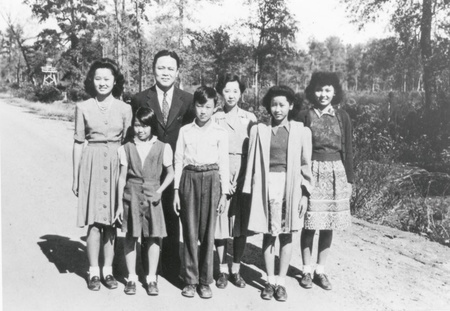
An “Aha” Moment with a Single-Mom Client
Kagawa today has won the respect of his industry peers — earning the recognition last November of the National Association of Insurance and Financial Advisors, which named him 2020 Diversity Champion. However, as a young man, he doubted he would follow his grandfather’s and father’s footsteps. Their firm had been thriving, established then strengthened by these two generations, by the time he began to figure out his destiny within the Kagawa dynasty. However, as a young person, Stephen Kagawa was initially skeptical of the ethical meaning and true social value of selling financial services to people.
“I did not want to come to the [family] business; I thought that life insurance was a rip-off,” Kagawa admits, with characteristic frankness, “sold by people in plaid suits and fancy talk. I did not want to be a part of it.”
However, when he was a 22-year-old intern for the family firm, a seemingly everyday — but actually powerful — experience changed his mind. He met Cathy, a single mother from South Central Los Angeles who had just lost her husband. “I was fortunate enough to meet a young lady who expressed that life insurance [of her late spouse] had saved her life,” he recalls. Because she was able to survive the loss of that breadwinner due to her insurance plan, she saw his family and its business as representing heroes to her and her children.
The young, rebellious Kagawa felt humbled, soberly realizing that “People like me — who had been questioning products and services of how things are done in the financial business — serve people like her.” The “aha” moment made him feel “so small, like a pathetic silver-spoon kid who got sucker-punched.”
Kagawa writes about turning points like this one in his book, to show “how bad I was as a kid and how that lady’s story [gradually] impacted me. I realized, so many years after, that people who go into the financial-planning business want to help people.” He newly appreciated the business that had been done by his ancestors — the good intentions and deeper motivation behind their work.
Rebooting the Broken
The book’s central message, aimed at the financial industry, is one of reform through relationship-building, much as his ancestors had worked with innovators such as Giannini to broaden the earlier insurance market and humanize clients of color by regarding them as equal to whites. “There is something broken between financial advisors and the people they advise,” criticizes Kagawa who feels advisors pay too much attention to what they think their clients need — and not enough time listening to what these people actually want.
“We have to fix that. If I felt the way I did, that their [insurance and financial services’ salespeople’s] reputation earned was bad, I want to change that. I want to help advisors change the way they do things. I want people who need advice to change the way they feel about advisors.”
His experience as a young man, in grasping that there in fact could be meaningful (not just hard-sell) relationships between advisors and clients, shaped his critical approach to financial work today: “90% of the work, we are taught, is to sell [to clients] mostly. We are not rewarded for good behavior,” he evaluates bluntly, “but to sell products.” Instead, Kagawa asserts, they should build their practice around abundance. “Stop competing with people — see abundance, be partners, start helping each other. Help those we agree to serve. We are in the servant business.”
A Collaboration Value-Based and Specialist-Curated
In his book, Kagawa also talks about how he not only wants financial workers to succeed but also to find joy in what they do. “It’s really our core values that direct what they [the advisors] do in their lives. If we surround ourselves with great values, we will have great careers,” he asserts.
Five words influenced by Native Hawaiian culture are the values by which he runs his business: Aloha, mahalo, imua, pono, and ‘ohana. He grew up in Hawai‘i, figures Kagawa, so these values naturally inform his way of dealing with clients. Instead of selling one set of products, his approach is collaboration between excellent, well-chosen advisors whom he puts together so as to best help each client: a win-win-win situation.
“People do not have needs (food, shelter, etc.) but wants and desires. I want to help them find what will fulfill their lives,” he states. “So I have to change my perspective and stop selling; to discover what’s important to a person.
“The fact of the matter is we will all die and get old, and [when we’re] feeling really old, life hits us; people [then realize they are] unprepared for life. Our job as advisors is to help people prepare for these realities — what is that life fulfillment?” he asks himself when dealing with each client.
Kagawa curates financial and related services for those who come to him, without necessarily taking an immediate fee; instead of going for the quick close, or for sheer sales volume, as others in his business have done so much in recent decades, Kagawa focuses on building networks of carefully pruned information and specialists that he hopes will lead to positive outcomes for his clients. Which hopefully in the long run may result in consistent, strong returns for himself and his firm.
This seems a very old-school, small-town, small-business way to work in an industry seen by many as a monstrous force which eats up whole sectors and classes of clients, voraciously to generate the bottom line, in the most impersonal way. When I ask him how can this possibly give his firm the sales it needs to survive, he answers frankly that if he does not have the knowledge and skills to satisfy his clients, he does not deserve to be in the industry.
Kagawa finds financial, tax, planning, and investment specialists with “amazing core competencies” in specific areas, then introduces them to his clients based on their specific financial and investment goals. He avoids selling them generic packages and pushing their sale, analyzing instead at how each client has certain wants in mind which he tries to help them achieve realistically. Does he get a cut of these introductions? He says he does not, but seems to trust that the holistic approach will pay off over time, as he builds his own credibility and relationships. When his clients know they are taken care of, they will return to that specialist and her or his services, so that everyone benefits, the collaboration-oriented CEO says.
Kagawa’s strategy is innovative as well as outside the box (IMHO), but considering his high aim of transforming an unjust industry as L.T. had once helped to accomplish, one cannot but cheer for the privileged and visionary leader of the Pacific Bridge Companies. May his humanistic risks — and his globally interconnected approach — pay off in the long run.
“Unless individual advisors make the change, it will never happen,” Kagawa summarizes. “When financial advisors come in through the big firms, come in through those systems — they are going to be taught how to sell the company products. Most companies need to.
“So us as advisors should make the change,” he advises. “When we make the change, financial institutions will make adjustments. Until then, they will keep with the same thing.”
* * * * *
For more of Kagawa’s philosophy, see this February 24 Author Hour podcast by Mike Rote: “Aloha Financial Advising: Stephen Kagawa.”
Aloha Financial Advising: Doing Good to Do Better for Your Clients and Yourself is available at Amazon via Kindle digital ($6.49), hardcover ($25.99), and paperback ($15.99) versions.
*This article was originally published by The Hawai‘i Herald on April 2, 2021.
© 2021 Ida Yoshinaga/The Hawai‘i Herald


